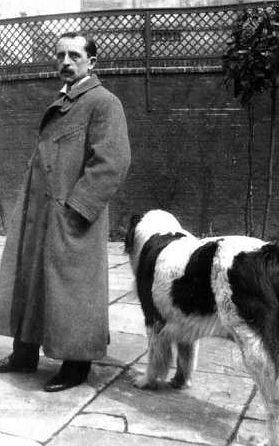[ Barrie / Peter Pan ]
J. M. Barrie (1860 - 1937) was a Scottish writer who spent much of his adult life in England. He is best known as the creator of Peter Pan.
The character of Peter Pan first appeared in a 1902 novel by J. M. Barrie; Peter was then given life in a 1904 play entitled Peter Pan; or, the Boy Who Wouldn't Grow Up. So popular was the play that Barrie's publisher took the original chapters from that 1902 novel and published them as a separate book. Barrie then reworked the story of his play as a novel, published as Peter and Wendy in 1911. There have been various adaptations for print, stage, and screen over the years.
 J. M. Barrie with Luath
J. M. Barrie with Luath
One of the most famous literary Newfoundlands, Nana was created by Barrie for his most famous work. Barrie's depiction of Nana is said to have been strongly influenced by the behavior of his own Newfoundland, a male Landseer named "Luath" after one of the dogs in Robert Burns' "The Twa Dogs." (Curiously, one of the two dogs in Burns' poem is a Newfoundland, but Barrrie chose to name his Newfoundland after the other dog, a collie.) We also know that the first actor to play Nana onstage (yes, an actor in a dog suit played that role, rather than a real Newf) spent hours at Barrie's home studying Luath so he could copy some of the dog's behaviors. (Barrie and his wife divorced after 15 years of marriage, and she got the Newf, who later was featured in a painting by a friend of the man Barrie's wife married after her divorce.) Luath is also discussed at length in Dogs and Men (1924), a book by Barrie's former wife, the actress Mary Ansell, which discusses the dogs she owned in her life.
Here is Peter Pan's description of Nana and her place in the Darling household:
Mrs. Darling loved to have everything just so, and Mr. Darling had a passion for being exactly like his neighbours; so, of course, they had a nurse. As they were poor, owing to the amount of milk the children drank, this nurse was a prim Newfoundland dog, called Nana, who had belonged to no one in particular until the Darlings engaged her. She had always thought children important, however, and the Darlings had become acquainted with her in Kensington Gardens, where she spent most of her spare time peeping into perambulators, and was much hated by careless nursemaids, whom she followed to their homes and complained of to their mistresses. She proved to be quite a treasure of a nurse. How thorough she was at bath-time, and up at any moment of the night if one of her charges made the slightest cry. Of course her kennel was in the nursery. She had a genius for knowing when a cough is a thing to have no patience with and when it needs stocking around your throat. She believed to her last day in old-fashioned remedies like rhubarb leaf, and made sounds of contempt over all this new-fangled talk about germs, and so on. It was a lesson in propriety to see her escorting the children to school, walking sedately by their side when they were well behaved, and butting them back into line if they strayed. On John's footer [in England soccer was called football, "footer" for short] days she never once forgot his sweater, and she usually carried an umbrella in her mouth in case of rain. There is a room in the basement of Miss Fulsom's school where the nurses wait. They sat on forms, while Nana lay on the floor, but that was the only difference. They affected to ignore her as of an inferior social status to themselves, and she despised their light talk. She resented visits to the nursery from Mrs. Darling's friends, but if they did come she first whipped off Michael's pinafore and put him into the one with blue braiding, and smoothed out Wendy and made a dash at John's hair.
No nursery could possibly have been conducted more correctly, and Mr. Darling knew it, yet he sometimes wondered uneasily whether the neighbours talked.
He had his position in the city to consider.
Nana also troubled him in another way. He had sometimes a feeling that she did not admire him. "I know she admires you tremendously, George," Mrs. Darling would assure him, and then she would sign to the children to be specially nice to father. Lovely dances followed, in which the only other servant, Liza, was sometimes allowed to join. Such a midget she looked in her long skirt and maid's cap, though she had sworn, when engaged, that she would never see ten again. The gaiety of those romps! And gayest of all was Mrs. Darling, who would pirouette so wildly that all you could see of her was the kiss, and then if you had dashed at her you might have got it. There never was a simpler happier family until the coming of Peter Pan.
Nana is mentioned dozens more times in this novel (although the word "Newfoundland" is used only once, in the above passage), primarily in the first half.
The complete e-text of Peter Pan (the novel; this story began life as a play) is available here at Project Gutenberg.
J. M. Barrie was one of many famous individuals who owned Newfoundlands at some point during their lives. You can find an annotated list of well-known Newfie owners here at The Cultured Newf.

